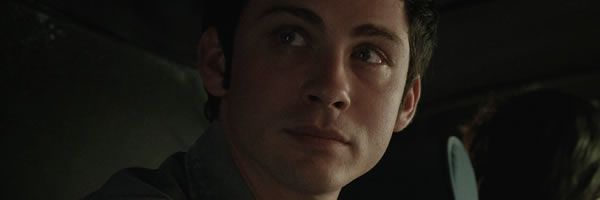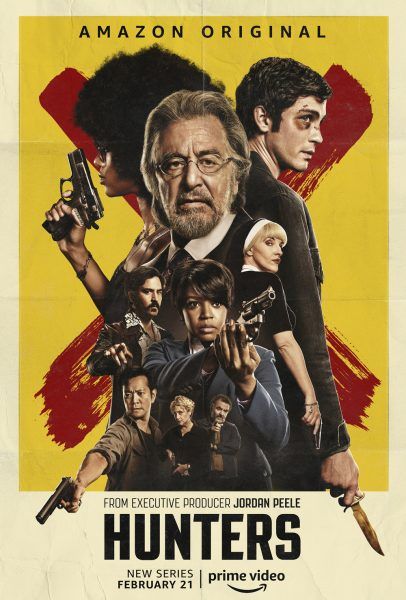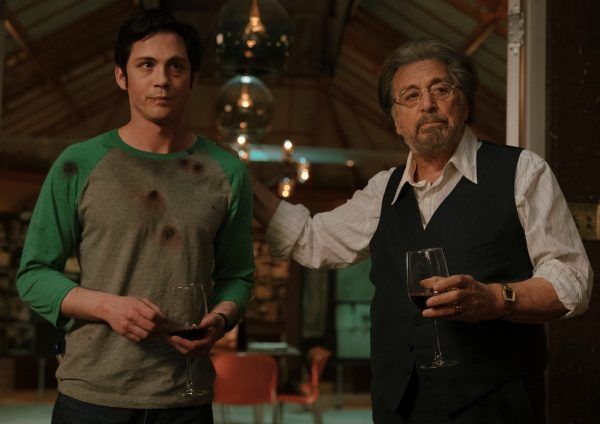From co-showrunners David Weil (who also created the series) and Nikki Toscano, the Amazon Prime Video original series Hunters follows a diverse band of Nazi hunters, lead by Meyer Offerman (Al Pacino), living in 1977 New York City, who have discovered that hundreds of high-ranking Nazi officials are living among the population as they work to create a Fourth Reich. Leaving a trail of blood behind as they bring the Nazis to justice and attempt to stop their genocidal plans, Jonah Heidelbaum (Logan Lerman) finds himself in the middle of this secret world of vengeance and he must decide just how far he’s willing to go.
During this 1-on-1 interview with Collider, actor Logan Lerman talked about how Hunters is different from the other TV series he did when he was younger, why he wanted to be a part of this project, the experience of working with Al Pacino, character dynamics, the biggest challenges, shooting the dance number for Episode 3, and how much he knows about possible future seasons.
Collider: When you signed on to do this, did you have any idea that it would be what it’s become?
LOGAN LERMAN: No, I had no idea. This is my first time really doing a TV show. Last time I did a show (Jack & Bobby), I was 12 years old, so it was a very different experience. It was a bad and good experience, that show. It was very different. And I know times have changed and television has changed. TV was different, and the rules were different. It was 24 episodes. It was insane. All of the rules of network television are just terrible. But with this one, I had no idea, even when making it, whether or not we were making something good. I just wanted to find the best things, every day. I wanted to find the best things in the scripts and rework them, and think about them and fully realized them with the team. Hopefully, we made something that people will like. But initially, all I had was the pilot. No one was able to read any of the other scripts. So, it’s this blind commitment and it’s scary. If just became, “Well, let’s work as hard as we can to make these episodes as good as possible, within the time period that we have.” I had confidence in the team. I love (pilot director/executive producer) Alfonso Gomez-Rejon so much, and (executive producer) Jordan Peele, and Nikki [Toscano] and David [Weil], the showrunners, and everybody. There are good minds in there. And then, our group grew and we added more talent that was just incredible. Al Pacino came on, and everybody else, and it was just a great group of people. It’s so cool to fully realize the show with those minds.
It can’t hurt to spend the day at work with Al Pacino.
LERMAN: It can hurt. It can hurt real bad. I’m just kidding. No, it’s great. Al’s the best. I love Al, so much. I spend so much time with him. I remember talking with my friends and family and just being like, “Even if this sucks and it’s the worst show ever, I got to spend a year with Al, hearing all of his stories.” Working with him and learning from him was just the greatest experience of my life. It’s incredible.
What’s it like to work with somebody like that, who’s seen and done it all? Do you feel like you’re growing, as an actor, just by being adjacent to him?
LERMAN: Yeah, definitely. He’s very generous and very humble. It’s an interesting combination, especially with an icon like him. He doesn’t think you wanna hear about his past ‘cause he’s so humble and sweet. But once he opens up, he’ll tell you stories, and you just learn so much about the history of the movies that he made. I think the most interesting thing about my experience with him was just the de-mystification of an icon. This person you see as being a genius, you realize that they’re just human, and they’re hardworking, and they’re not too different from you. You can work together and make a good film or TV show together. It’s a similar process. It’s not this elevated process that’s different from your own. I just loved working with him, so much.
Was there anything, from working with you, that you realized you approached, in the same way?
LERMAN: All the time. We have a fairly similar work ethic, in terms of our commitment to the production and how we like to work. We actually lined up really well, in terms of wanting to meet up on the weekends and read the script and talk about things. It was really great to do that with Al.
I love the dynamic that you have with Saul Rubinek and Carol Kane. What’s it like to explore that dynamic?
LERMAN: It was a pleasure just because they’re lovely people to work with. Jut like Al, they’re icons that have been doing it, for a very long time, and have so much wisdom. I would just try to scrape off a little piece of advice or some stories from projects that they’ve worked on. I just loved working with Saul and Carol, and the whole cast. Carol and Al have such a long history together, going way back to their theater days in the ‘70s, working together. It was really cool.
What are the biggest challenges in doing this show?
LERMAN: One of the biggest challenges is just the television structure, itself. It’s very different than a film, which I’m able to just prep, as long as I can. You have that one script, and you’re trying to figure it out. This is prepping a season without seeing the scripts until shortly before you shoot them, and then you’re scrambling. It’s this on-the-go thing, with revisions. As an actor, myself, I have a vision of the entirety of the season, and what my character’s arc is and where we end, but without getting the scripts, I still have to keep that throughline clear, and make sure that my character is consistent in tone and in terms of what they want and just who they are. I had to have ownership over that and try to keep that consistent, throughout the series. That was one of the biggest challenges. And then, there’s just the task at hand, which is the scene work. It was very emotionally difficult and tricky subject matter, and it’s hard to tap into that mind space and try to find truth within it. Hopefully, people liked it.
I love that moment when Al Pacino says, “The best revenge is revenge,” because that’s true when you’re fighting Nazis.
LERMAN: The most interesting thing about the series, for me, is that question at the center of it, which is, does it take evil to fight evil? In order to fight the bad guys, do you need to be bad yourself? I really responded to that, and that’s what anchored my interest in Jonah and the series and everything. I wanted to try to figure out how we would handle that question. What is morality? What is justice?
Does Jonah get any better of a grip on what’s going on?
LERMAN: Yeah, there are a lot of twists and turns, and things that happen. I don’t want to ruin the season, but there’s an interesting arc. Don’t expect anything. Shit changes. Crazy stuff happens. It’s a fun series, in that way. We really do take left turns and find some ways to make it surprising and original.
Everything is based in family for Jonah because his grandmother and that relationship is so important to him.
LERMAN: Yeah, especially in the first couple of episodes, there’s a lot of anger at the center of things for my character, and it’s about figuring out where to place it and how to handle the situation.
This is a series where you can hunt Nazis and have a dance number. What was that like to shoot?
LERMAN: That was ridiculous. That’s why it’s hard to explain this show to people. There are so many different tones and things going on. It’s all over the place. It’s unlike anything that I’ve seen before, and I think people will be surprised by it. That dance number is one of the only things that I’m dreading watching. I had to learn it that day, that whole thing, and I’m not a good dancer. All of these people were around and I was on the spot. It was so ridiculous. It was absurd. That was the one day where I was pretty frustrated with myself, mostly just not being able to dance well. I’m not a dancer. It’s so hard. I was trying my best, with all of these professional dancers. It was fun. We were really trying to play with the format and see what we could do.
Did you have script read-throughs?
LERMAN: We did that twice and everyone hated it and was like, “Why are we doing this? We know what the script is. We can all read it.” I never understood table reads. We did that, but then mostly we started to replace that time with just sitting down as a group, including Al, myself, and Nikki and David, just talking about the scenes and the script. We’d just keep revising until we found the best version of what we were doing, hopefully. That won’t be validated until people see it. I’m curious.
As the season went on, did you start to have conversations about possible future seasons?
LERMAN: Oh, yeah. I know where it goes. I know where it goes for seasons. I’m the only one who does, and I’m not allowed to talk about it. But there’s a good plan. There’s a good plan for everything. It’s interesting, it’s a very secretive process, making the show. Episode by episode, we didn’t know what was gonna happen next. We’d get the scripts, but they wouldn’t tell us what was happening in the scripts, and we’d only get the scripts a week before shooting. I knew what was happening, but nobody else really did.
Hunters is available to stream at Amazon Prime Video.



